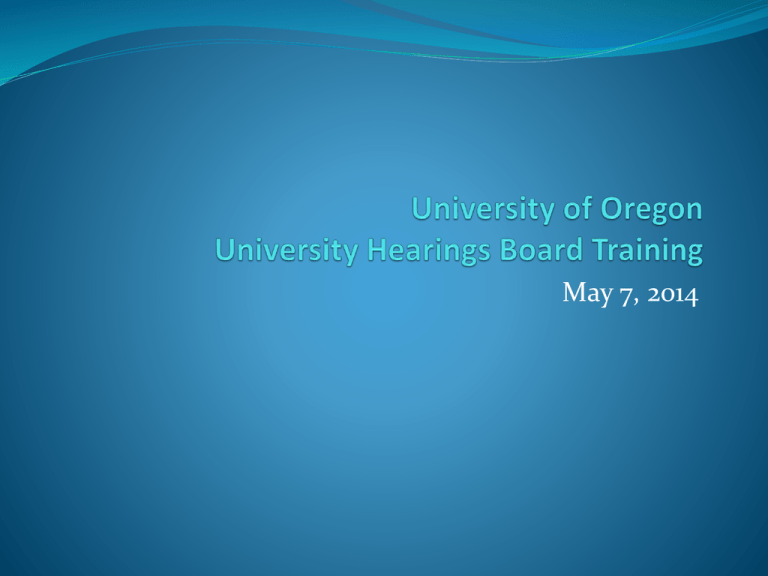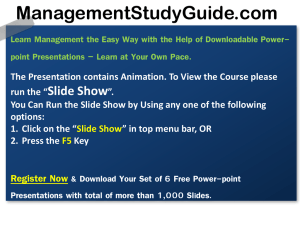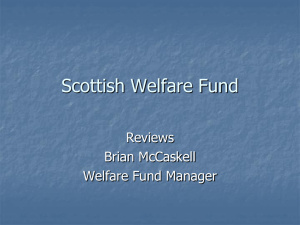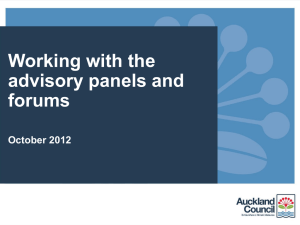
May 7, 2014
Brief Introductions
Welcome! Thank you for serving.
Around the room:
What is your name?
Why are you at the University?
Why were you interested in serving on the Board?
What is one thing you want people to know about you?
Language
SCCS = Student Conduct and Community
Standards
OSA = Office of Student Advocacy
UOPD= UO Police Department
IR = incident report
Residence Halls (dorms)
Responsible (guilty)
Not Responsible (not guilty)
Sanctions (punishment)
Accused Student (defendant)
Complainant (The State)
SCCS: Mission
The mission of the Office of Student Conduct and
Community Standards is to develop students’
academic and social responsibility. We value integrity,
responsibility, community, multicultural competence,
and accountability.
UO Affirmation of Community
Standards
The University of Oregon community is dedicated to the advancement of
knowledge and the development of integrity. In order to thrive and excel, this
community must preserve the freedom of thought and expression of all its
members. The University of Oregon has a long and illustrious history in the area of
academic freedom and freedom of speech. A culture of respect that honors the
rights, safety, dignity and worth of every individual is essential to preserve such
freedom. We affirm our respect for the rights and well-being of all members.
We further affirm our commitment to:
Respect the dignity and essential worth of all individuals.
Promote a culture of respect throughout the University community.
Respect the privacy, property, and freedom of others.
Reject bigotry, discrimination, violence, or intimidation of any kind.
Practice personal and academic integrity and expect it from others.
Promote the diversity of opinions, ideas and backgrounds which is the lifeblood of
the university.
SCCS Philosophy: Educational
Process
SCCS makes its process educational for the student.
Every incident is a learning opportunity for all
involved.
SCCS always offers itself as a resource to the general
community, complainants, and the accused students
alike.
Why is this work important?
As representatives of the University of Oregon can
send a powerful message to students.
Alcohol and other drugs are a major problem on
this and all college campuses (see next slide).
Students’ quality of life and ability to complete
degrees are at stake.
Graduate schools, scholarship committees,
employers, etc. should be able to make an
informed decision about students.
Why is this work important?
continued
Death: 1,700 college students between the ages of 18 and 24 die each year from alcohol-related unintentional
injuries, including motor vehicle crashes (Hingson et al., 2005).
Injury: 599,000 students between the ages of 18 and 24 are unintentionally injured under the influence of
alcohol (Hingson et al., 2005).
Assault: More than 696,000 students between the ages of 18 and 24 are assaulted by another student who has
been drinking (Hingson et al., 2005).
Sexual Abuse: More than 97,000 students between the ages of 18 and 24 are victims of alcohol-related sexual
assault or date rape (Hingson et al., 2005).
Unsafe Sex: 400,000 students between the ages of 18 and 24 had unprotected sex and more than 100,000
students between the ages of 18 and 24 report having been too intoxicated to know if they consented to
having sex (Hingson et al., 2002).
Academic Problems: About 25 percent of college students report academic consequences of their drinking
including missing class, falling behind, doing poorly on exams or papers, and receiving lower grades overall
(Engs et al., 1996; Presley et al., 1996a, 1996b; Wechsler et al., 2002).
More statistics at www.collegedrinkingprevention.gov.
SCCS Philosophy: Confidentiality
One part of SCCS’s philosophy is confidentiality.
SCCS keeps all student conduct records private unless
the student waives the right to privacy. (FERPA)
All Hearings Board members (and participants) need
to keep what happens in a Panel Hearing confidential.
Panel hearings are closed hearings.
Student Conduct Code Overview
Oregon Administrative Rules
Definitions
Jurisdiction
Violations by Individual Students
Sanctions
Student Rights
University Hearings Board (p. 19)
University Panel Hearings (p. 24)
Brief Overview of Conduct Process
See “Conduct Process Overview” flowchart.
Important elements for Board:
Student has due process rights.
Student has a choice of hearings.
Most of the time, administrative conferences and panel
hearings have different limitations on sanctioning
ability, as well as ability to appeal.
Allegations and Jurisdiction
SCCS (or one of its designees) evaluates the report
and determines which Student Conduct Code
violations may have been violated.
Typically, the University focuses on conduct
inconsistent with the Code on campus, Universitycontrolled property, or University-sponsored
activity.
However, the University may have authority if the
conduct “involved violence or produced a
reasonable fear of physical harm.”
Basics: What is a Hearings Board?
It is “comprised of persons authorized … to determine
if a student has violated the Student Conduct Code
and to recommend sanctions when a violation has
occurred.”
It consists of 10 registered students and 8 faculty/staff
members for a total of 18.
Students serve a one-year term while others serve two
years.
Members can be re-appointed.
Basics: What is a Hearings Panel?
A Panel is the actual body that hears a case and must
have at least four members of the Board.
Of those four (or more) it must have at least one
student, one faculty, and one staff.
Both the Complainant and the Accused Student can
present their stories.
A Panel hearing is a scripted event and is audio taped.
If the student is responsible, a Panel always has the
power to apply the full possible range of University
sanctions.
Either party can appeal the Panel’s decisions.
Basics: What kinds of cases?
The Panel may hear ANY violation of the Student Conduct
Code.
Likely cases include:
Academic Misconduct
Cheating
Plagiarism
Social Misconduct
Alcohol and other Drugs
Disorderly Conduct
Physical Contact
Harassment and Unwanted Contact
Weapons
Sexual Misconduct
More on this later!
Basics: Why a Panel hearing?
Sometimes, SCCS refers the case to a Panel
because of special concerns or the type of charge.
The referral is often, but not always, based on the
fact that the Panel can invoke the three most
severe sanctions.
Other times, the Accused Student wants the Panel
because he/she wants to confront the
Complainant, have the right to appeal, and for
other reasons.
Panel should not assume a case is “serious”
because it is getting the case.
Basics: Does it have to go to Panel?
If a student has been referred to Panel, but does not
want to go, there is another option: an administrative
hearing with the full range of sanctions possible.
In this case, the student waives the right to a Panel
hearing.
In these types of hearings, as in all administrative
hearings, are not appealable.
Basics: Who is at the Panel
hearing?
Usually 4-5 Panel members and a Panel Chair, who
must have served at least one year.
Complainant
Accused Student
Witnesses (they stay outside until called)
Others, if the Accused Student allows it
Advisors
General Counsel
Complainant Advisor
Accused Student Advisor
Specifics: What happens before the hearing?
SCCS sends a Notice of Allegations to the Accused
Student.
Student selects or is referred to Panel
Panel selects a chair. The Chair must have served
on the Board the previous year.
Once scheduled, SCCS sends a Notice of Panel
Hearing and a letter to participants, and the
hearing takes place 20-30 days after the
notification.
Specifics: Before the hearing
continued
Read and understand the Code as well as you can.
Feel comfortable asking General Counsel or SCCS
questions about it.
SCCS will e-mail you hearing information (e.g.
reports, statements, photos, etc.) about two days
before the hearing. Please hard delete these files
when done with the case.
You may see “pre-hearing motions.” GC
recommends you read them. They are considered
at the beginning of the hearing, at which the
Panel will either sustain or deny the motion.
Specifics: The Hearing
Please refer to “Student Conduct Board Hearing Script”:
Introductions
Charges, answer to the charges
Promising/swearing in (happens multiple times)
Introductory remarks, questioning
Witnesses, questioning
Closing remarks
Decision
If responsible:
character witnesses, questioning
Sanction considerations/request
Conclusion
Specifics: Asking Questions
All questions are asked by or through the Panel.
Asking questions is critical: If one wants to know,
one needs to ask.
Be critical of answers. Ask follow-up questions.
Ask open-ended questions whenever possible
(avoid yes/no questions).
Chair/members may limit the testimony of
witnesses, including character witnesses,
especially on the basis of relevance.
Specifics: Standard of Proof
The Panel’s standard is the “preponderance of
evidence.”
In other words, what “more likely than not
occurred.”
Another possibility: more than 50% belief that the
violation occurred.
Compare this with the criminal justice system’s
“beyond a reasonable doubt.”
When imposing expulsion, the Panel uses the
“clear and convincing” standard.
Specifics: What kind of
information?
SCCS will do its best to make sure all relevant
information is available.
Panel may ask for more information.
Know that the student may have prior documentations
and findings of responsibility and that information
will only be presented if they are relevant to the case at
hand.
Specifics: Evaluating information
How relevant is the information?
How did the person come to know this information?
How much detail is the person giving?
Is the person’s information consistent with others?
What biases may the person have when giving
testimony or other information?
Specifics: Making the Decision
Consensus is preferred
Next is majority vote, but Chair cannot vote
Remember, it is the preponderance of the evidence
50% plus a feather…
Practice: Decision Scenarios
Decision
Scenario
#1 hear music coming
Housing reported
staff could
from a room from at least four doors away and
residents have complained. The room owner tells
the panel that his music is no louder than what
other people have played and that these residents
are using the student conduct system to “bully”
(his word) him. Housing staff tells the panel that
the student has been warned on multiple
occasions, and other residents tell the panel they
have had enough of this student’s inconsiderate
behavior.
Decision Scenario #2
DPS finds a student quickly walking away from a
car on campus. The student in the car yells, “Hey,
where are you going?” DPS asks the student in the
car what is going on while observing a duffle bag
on his lap. The student allows a search. In the
duffle bag is a scale, $300 of cash in various
denominations, multiple individually bagged
marijuana (less than ounce total). Is the student
responsible for drug distribution?
Decision Scenario #3
Both Residence Hall staff and DPS report a the smell
of marijuana coming from a single-occupant room. A
towel is stuffed into the bottom of the door. Nobody
answers, and the door is locked. The student has had
five nearly identical previous incidents but was found
not responsible every time. Is the student responsible
for drug use/possession?
Decision Scenario #4
A professor reports seeing a student take “long looks”
at another student’s test three times during an exam. A
GTF also reports observing the same thing. The
student states she was merely taking a break and
looking around the room. The student’s test does not
appear to indicate that she copied anything from the
nearby student. Is the student responsible for
cheating?
Specifics: The Decision
If the student is “not responsible,” there is no further
action (i.e. the Panel cannot assign sanctions). The
student’s conduct record for this case will become
“void.”
If the student is “responsible,” the Panel assigns
sanctions.
Specifics: Sanctions
Students can change their behavior to be
consistent with what the University expects.
Educational sanctions can help a student learn
from their behavior and make better choices.
Refer to the list of sanctions and their descriptions.
This is your “tool box.”
Be creative and use the principles of Restorative
Justice, but make sure you serve the interest of the
University community.
Specifics: Restorative Justice
Restorative Justice is a philosophy as well as a process.
Restorative Justice philosophy focuses on the affected party
and to heal the harm.
Ways to do this:
Paying close attention to how the Complainant and University was
harmed.
Finding ways for the responsible student to make a direct
restoration to the affected party by incorporating it into the
sanction.
The Panel can also refer the student to the Restorative
Justice process, which includes interviews, a facilitated
circle, and agreements.
Sanctions: “The Big Three”
When should a Panel utilize “The Big Three”?:
Suspension
Expulsion
Negative Notation on the Transcript
Ultimately, the Panel decides but can, and should,
use the suggestions of the Complainant, the
responsible student, and the expertise of GC and
SCCS to arrive at when it is appropriate to apply
them.
Sanctions: Alcohol and Other Drugs
BASICS 1, BASICS 2, and BASICS 3
In: Charge! Marijuana
In: Charge!
Drug and Alcohol Assessment (off campus)
AA, MA, NA meetings (off campus)
Reflection papers, interviews, posters, projects,
research, presentations, etc.
Sanctions: Others
University service
Community service
Educational activities, especially those that help the
student engage with the University community more
Loss of privileges (e.g. Rec Center, dining hall, athletic
tickets, etc.)
Grade penalty and academic integrity exercises
(academic misconduct only)
Sanctions: About Counseling
Panel cannot mandate counseling
However, panel can encourage counseling
BASICS 1, BASICS 2, and BASICS 3, run by the UCTC,
and the Men’s Skills group are not considered
counseling
Student Conduct Records
Different from academic record
Most are kept for only five years from the incident date
Effect is to allow inquirers to make an informed
decision
Many schools, programs, employers, etc. do not even
ask
See examples
Sanction Scenario #1
Student admitted responsibility for underage alcohol
use and disorderly conduct (noise) from a party in a
residence hall room; this is her first offense.
Sanction Scenario #2
Same as above except student tells you
during the hearing that she is
recognizing that she is having difficulty
managing her alcohol use, and is
scared that she has blacked out on
numerous occasions after using
alcohol.
Sanction Scenario #3
Student found responsible for drug use/possession
(smoking marijuana at the EMU amphitheater). She
would not give DPS her ID and yelled insults at them
during the incident. During the hearing the student
said she thought the Panel was a waste of time and a
joke; this is her first offense.
Sanction Scenario #4
Same as above, but this is the student’s fourth incident
and has been found responsible three prior times for
alcohol and/or drug violations. She has already
completed BASICS 1, 2, and 3, eight AA meetings, and
all the corresponding essays. The student is also on
disciplinary probation.
Sanction Scenario #5
Student is found responsible for bringing
unauthorized material (a page of notes) to
a math final. The student was previously
found responsible for plagiarism in a
writing class, where he earned a F.
Specifics: Panel Chair
Most important duties:
All procedural questions are subject to final
determination by the Chair
Keeping the hearing on track and on time
Processing questions, consulting with Panelists and GC
as necessary
Making sure all parties get to share their information
with the Panel
Making sure advisors do not overstep their roles
Specifics: Advisors
In order to preserve the educational tone of the hearing and to avoid an
adversarial environment, advisors are generally not permitted to speak or
participate directly in any hearing, except in one or more of the following
specific ways:
(A) An advisor may provide a written opening summary or statement.
(B) An advisor may provide an oral closing summary or statement.
(C) An advisor may be allotted a limited time-period to ask one or more
questions of the Student the advisor is advising and to allow the Student to
respond. Questions asked by an advisor are in addition to questions asked by
the Hearings Panel.
(D) An advisor may submit to the Hearings Panel in writing any suggested
questions for the Hearings Panel to ask of any other participant who is giving
information at the hearing.
(E) The Hearings Panel may permit advisors to question a person providing
information at the hearing, if both Complainant and Accused Student
independently so request at the beginning of the hearing.
Specifics: Advisors continued
Advisors can be another student, staff, faculty,
family, friend, attorney, or a member of OSA.
Advisors have a limited role in the hearing.
Know that SCCS may be assisting the Complainant
as an advisor.
The Panel has the right to ask an advisor to leave,
especially if the advisor is interfering with the
process or not allowing the student to speak for
himself/herself.
Sexual Misconduct
Sexual assault is one of the most underreported
crimes; sexual misconduct is likely one of the most
underreported violations.
False reporting is rare.
Most sexual misconduct occurs between students
who know each other (compare with the stranger
in the bushes).
Do you now what constitutes sexual misconduct at
UO?
More on Sexual Misconduct
Avoiding victim-blaming can be difficult for some.
If Panel were to hear a sexual misconduct case,
Director may make accommodations for Complainant
and/or witnesses
Developing appropriate sanctions for a foundresponsible student can be difficult.
Doing it for real: Scenario #1
Complainant: University Housing
Accused Student: Alan Brady
Incident Report: Residents told Resident Assistants that
Alan Brady had “sketchy” people visiting his room
frequently. Brady consents to a search by DPS, and ¼ ounce
of marijuana separated into small baggies, a marijuana
pipe, a scale, and $300 cash are found on his side of the
room. DPS also finds a small locked box that Brady would
not allow to be opened. DPS noted the box was heavy,
maybe 10 pounds.
Charges: Drug distribution, drug use/possession, violation
of the residence hall contract.
Complainant:
Prof. Samantha
Hardy #2
Doing
it for real:
Scenario
Accused Student: Colleen Santos
Incident Report: Prof. Hardy prohibited students
working in unauthorized groups for performing a
chemistry experiment in her syllabus, the
experiment instructions, and orally in class.
Santos sent an e-mail to the entire class asking
interested people to get together tomorrow at 3
p.m. to work on the experiment as “more heads
are better than one.” Santos said she did meet
with others, but they refused to work on that
specific experiment with her.
Charges: Academic Misconduct
Doing
it for real:
Scenario #3
Complainant:
Gwen Huang
Accused Student: Bob Mitchell
Situation: Huang reported that she had known
Mitchell for at least a term. They coincidentally
went to the same party off campus where alcohol
was served. Both stated they had drank at least
five drinks each at the party. At around 1 a.m.
Huang wanted to go home, and Mitchell
volunteered to walk her back. When they arrived
at her apartment, Huang said she consented to
kissing Mitchell.
Doing it for real: Scenario #3
continued
However, when Mitchell touched her breasts, she
remembered moving his hands away. Then, she said she
doesn’t remember what happened next, but she thought
Mitchell pushed her to the floor. She also thought Mitchell
got her pants off and penetrated her with his penis.
Mitchell said he did walk Huang home but that all their
sexual activities were consensual. He added he
remembered Huang never said “no,” and they discussed
whether she had birth control. There is no medical report
because Huang never went to see a health professional. She
waited five months to file the report with the University.
Charges: Sexual misconduct, physical contact
Contact Information
Rachel Basolo, Program Assistant
6-1140
rdhowe@uoregon.edu
Sandy Weintraub, Director
6-1141
sandyw@uoregon.edu
Website: http://conduct.uoregon.edu









